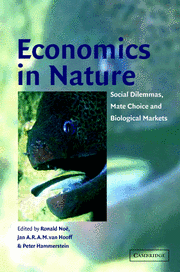1 - Games and markets: economic behaviour in humans and other animals
Published online by Cambridge University Press: 04 August 2010
Summary
Introduction
Economists think they know how humans ought to behave if only they were smart enough. Biologists have some knowledge of how animals actually do behave. It does not seem a feasible question to ask how animals ought to behave. Yet, there is a conceptual link between normative economic theory and its empirical biological counterpart. Darwinian evolution often creates animal traits that look to an observer as if the animal did care about the economist's advice. Therefore, economic analysis of animal behaviour has become a flourishing field of biological research in which games and markets play an important role. This chapter discusses fundamental concepts in human and animal economics. They are illustrated with examples from both disciplines. Furthermore, it is shown that the facts often do not meet theoretical expectations. Some hints are given as to why this may be so. Theory development in animal and human economics is far from being completed.
Evolutionary adaptation and bounded rationality: are animals better economists than humans?
Classical economic theory based most of its thoughts on the idea that decision makers are rational in the sense of maximising subjective expected utility. Savage (1954) axiomatised this Bayesian approach to decision making and Harsanyi & Selten (1988) explored it further in the game theoretic context of strategic interaction. However, the more the economic notion of rationality had been made precise, the less it seemed adequately to reflect properties of the real world. Rational decision makers are assumed to possess unlimited cognitive and computational power and to solve correctly every mathematical problem in zero time at no cost.
- Type
- Chapter
- Information
- Economics in NatureSocial Dilemmas, Mate Choice and Biological Markets, pp. 1 - 20Publisher: Cambridge University PressPrint publication year: 2001
- 6
- Cited by

